| Srl | Item |
| 1 |
ID:
123063
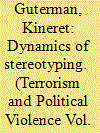

|
|
|
|
|
| Publication |
2013.
|
| Summary/Abstract |
This article considers popular ways of representing terror activists, and the metamorphoses that approaches to representation in the American media have undergone. A part of the article deals with terrorism in the media over time, common stereotypes, and how they affect the representation of Arabs and Muslims. The article then discusses Sleeper Cell (2005), a mini-series which focuses on a Jihad terror group. The article addresses questions including: How are Arabs and non-Arab Muslims portrayed in the series? Can a real change be observed over time in the method of portraying them? Twentieth-century historical considerations precede the pointed topical discussion.
|
|
|
|
|
|
|
|
|
|
|
|
|
|
|
|
| 2 |
ID:
124924
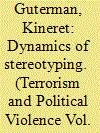

|
|
|
|
|
| Publication |
2013.
|
| Summary/Abstract |
This article considers popular ways of representing terror activists, and the metamorphoses that approaches to representation in the American media have undergone. A part of the article deals with terrorism in the media over time, common stereotypes, and how they affect the representation of Arabs and Muslims. The article then discusses Sleeper Cell (2005), a mini-series which focuses on a Jihad terror group. The article addresses questions including: How are Arabs and non-Arab Muslims portrayed in the series? Can a real change be observed over time in the method of portraying them? Twentieth-century historical considerations precede the pointed topical discussion.
|
|
|
|
|
|
|
|
|
|
|
|
|
|
|
|
| 3 |
ID:
160944
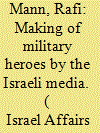

|
|
|
|
|
| Summary/Abstract |
Is there a place for military heroes in a post-heroic era and during post-heroic warfare? This article, focusing on the role of the media, especially popular media, in the construction of military heroes and heroism in twenty-first century Israeli society, suggests that, at least within the media, such heroes still play an important role. Based on test cases, among them the 2010 Mavi Marmara affair, the article presents and analyses journalistic professional considerations and practices involving stories about military heroes and explains how items about heroes and heroines correspond with the various requirements of the media. The article also analyses the use of social media in the construction of a new type of ‘folk hero’, who is often a controversial and disputed kind of hero, such as in the case of the soldier who shot and killed a wounded Palestinian terrorist in Hebron.
|
|
|
|
|
|
|
|
|
|
|
|
|
|
|
|
| 4 |
ID:
192862
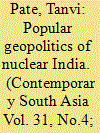

|
|
|
|
|
| Summary/Abstract |
Conventional wisdom on India’s nuclear geopolitics takes a top-down approach, foregrounding state perceptions of India’s nuclear role in regional and global politics. This conventional approach overlooks the bottom-up processes, such as media representations, which have been fundamental in shaping India’s nuclear identity. This is because media representations comprise common-sense knowledge, since media is the primary source of information in a democracy. Building on theoretical underpinnings of popular geopolitics, this article focuses on analyses of media representations in the Editorial of the English daily The Hindu from 2011–2020. This national newspaper boasts the second-largest readership among English dailies. The direct link between The Hindu Editorial’s representations of ‘nuclear India’ and India’s ‘regional’ and ‘global’ selfhood is crucial. The concerned period of 2011–2020 was pivotal in charting Indian geopolitical identity, as India partook in international negotiations after the US-India Nuclear Deal in 2008 and became a member of multilateral export control regimes like the Wassenaar Arrangement, Australia Group, and Missile Technology Control Regime. This article deconstructs the Editorial texts to elicit the intertextual links underpinning the ‘geopolitical cultural signifier’, ‘geospatial mythology’, and ‘self/other’ binary representation that operationalises India’s nuclear identity in regional and global settings.
|
|
|
|
|
|
|
|
|
|
|
|
|
|
|
|
| 5 |
ID:
155164
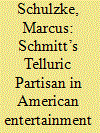

|
|
|
|
|
| Summary/Abstract |
This article explores the political significance of the narratives of partisan warfare that appear in American popular culture. I draw on Carl Schmitt’s concept of the ‘telluric partisan’ – a figure that fights outside the normative boundaries of conventional war in defence of a homeland and the traditional identities that are rooted in it. These fantasies provide a sense of moral clarity, promote national unity, characterise enemy aggression, and glorify traditional values. They establish a ready-made narrative that can be invoked to frame conflicts in terms of the heroic defence of an innocent and victimised people protecting themselves against foreigners and their dangerous ideologies. As I show, this call for popular engagement in war generally serves a conservative project of directing potentially revolutionary expressions of populism and vigilante justice into defence of family and the territorial status quo.
|
|
|
|
|
|
|
|
|
|
|
|
|
|
|
|